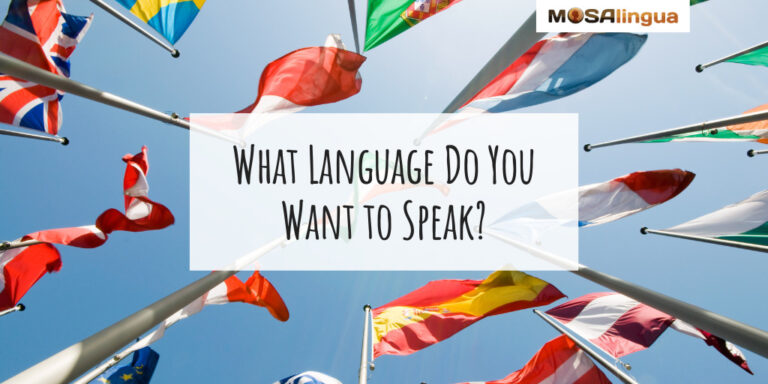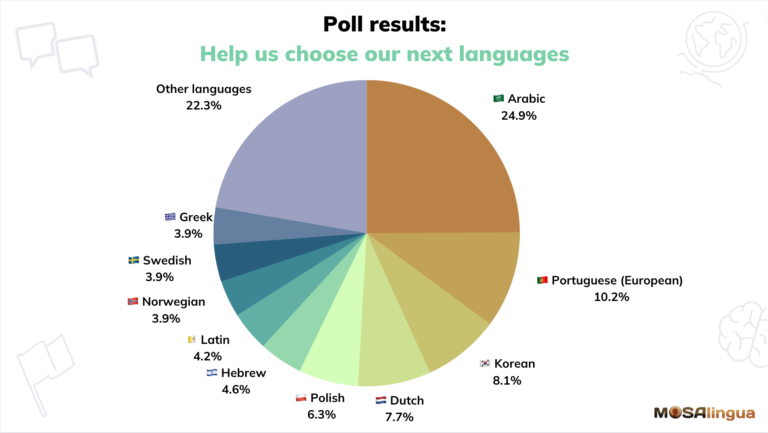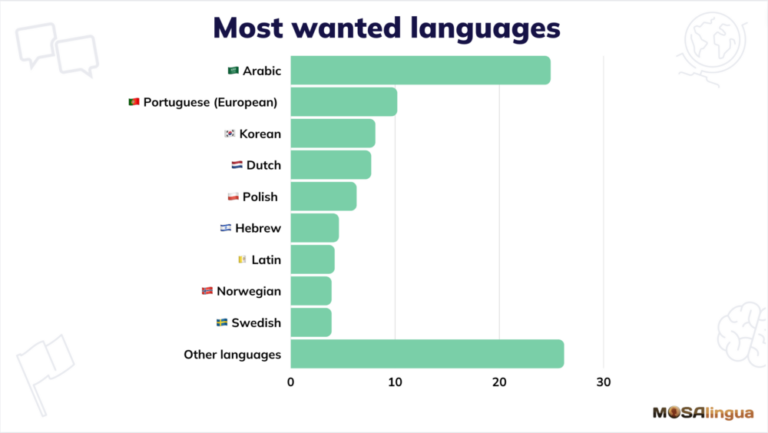Just like you, we’re all language lovers at MosaLingua. What languages have you always dreamed of learning? Or what language would be the most practical for you to learn? We asked our readers and MosaLingua users which languages interest them the most and we’ve made a short summary of your responses. Then we’ll use your feedback to develop Is your next language in the lineup?

Survey Results: What Language Do You Want to Learn Next?
We don’t just like languages at MosaLingua – we love them! So offering 9 languages to our readers and users just isn’t enough. We wanted to get your input on the subject to help us adapt our app to your needs and interests. Your opinion matters most to us!
We gathered a little over 300 responses to our question: What language should we add to the MosaLingua app next? Your responses were both interesting and unexpected. Have a look at the results below:
A poll to help us choose our next language to develop is still open. You can still give us your input!
🙂 Please don’t vote for the same language more than once; only one vote will be counted.
More About Your Top 10 Responses!
Arabic
We weren’t surprised to find Arabic in the top five. People speak Arabic as a native language on 3 continents: Africa, Asia, and Europe. It’s the 5th most spoken language in the world.
A whopping 24.9% of you chose it and we’re honestly very excited that you did. It’s a gorgeous language that allows those who speak it to tap into extremely rich cultures around the world.
There are also several other advantages to understanding and speaking the language. In fact, you’ll be able to travel to and explore about 20 different countries where Arabic is the official language – there’s Egypt, Algeria, Qatar, and Lebanon to name just a few. You’ll be able to delve into the riches of many ancient cultures whose innovations are part of our daily life.
What’s more, Arabic is spoken in many countries that play an important role in international affairs, such as Saudi Arabia, Egypt, Morocco, and the United Arab Emirates. Each of these countries is a key actor in global economics. Businesses seeking commercial partnerships and investments in these countries have to be able to communicate effectively with their local partners.
By learning Arabic, you’ll be in a great position to connect yourself with companies and organizations around the world, increasing your chances of finding success in the international job market.
European Portuguese
Next in the ranking, with 10.2% of the vote, came European Portuguese. You may not know this, but we already offer Brazilian Portuguese on our app. We decided to choose this variant because it’s more prevalent around the world. In fact, it’s the native language of 208 million people, and one of the top 10 most spoken languages in the world. Portuguese is not only the official language in Portugal and Brazil, but it’s also spoken in Angola, Cape Verde, Guinea-Bissau, Equatorial Guinea, Macao (China), Mozambique, São Tomé and Príncipe, East Timor, and Goa (India).
Portuguese is also an official language of the European Union. So yes, this beautiful language can be a very practical one to learn!
It’s important to note, that the Portuguese and Brazilian variants of this language use the same structure. Their vocabularies are pretty similar, as well. If you have experience with French, Spanish, or Italian, you’ll have a leg up! The shared roots between these languages can make them a bit easier to pick up, at least initially. So what are you waiting for?
Here’s a short video that illustrates some of the differences between Brazilian and European Portuguese:
Source: YouTube
Korean
Korean came in third place, with votes from 8.1% of respondents. The prospect of learning Korean might seem daunting to some, but we promise it’s a great idea, both personally and professionally. The language has seen a quick rise in popularity over the past few years.
It’s the official language of South Korea, which has experienced rapid development itself. In addition, about 80 million people speak it worldwide! If you’re interested in international relations, it’s an incredibly useful language to know.
Plus, Korean is a fascinating language in and of itself. It’s most distinguished by its alphabet, which admittedly can be quite difficult for non-native speakers to master. But just think of learning it as a very gratifying personal challenge!
The two previous arguments are pretty convincing, but I can’t neglect to mention Korean culture, as well! Personally, I have a bit of a weakness for Korean music and pop culture. You’ve surely heard of K-pop? Some of the biggest groups, like BTS and Blackpink have truly become international sensations. And the K-pop sound has started to influence acts from other parts of the world, too: Yun, a Parisian singer, is popular for mixing French and Korean in her music.
Source: YouTube
So speaking Korean will help you understand these songs, and enable you to connect with other fans of Korean culture around the world. Because, of course, there’s much more than just music. Did you watch Squid Game when it came out? Yes, this series (and many other great ones) was made in South Korea. The world of Korean media is at your fingertips, thanks to music and TV streaming services! There’s no better way to learn a language and have fun while doing it!
Dutch
7.7% of voters chose Dutch. Sometimes, there’s a bit of confusion surrounding what exactly Dutch is and where it’s spoken. Do people speak it in Holland? The Netherlands? Well, technically, Holland belongs to the Kingdom of the Netherlands.
Are you interested in learning Dutch? We think it’s a great idea! The culture of the Netherlands has charmed people for centuries: the canals of Amsterdam, tulips, cycling, gouda cheese, Rembrandt, Van Gogh, Tiësto, Martin Garrix… By learning this language, you’ll gain amazing access to this fascinating country and be able to communicate with its locals.
In addition to the richness of Dutch culture, the language itself is quite intriguing. It’s the maternal language of about 25 million people around the world. And yes, I have to say “around the world” because Dutch isn’t limited to the Netherlands.
People also speak Dutch in the Flemish region of Belgium. In all, about 60% of the Belgian population speaks Dutch! Locals in the Flemish region will certainly be appreciative if you’re able to speak a little of the language.
You’ll find it spoken on other continents, as well. In South America, it’s the official language in Suriname, and in Africa, a variant of Dutch known as Afrikaans is spoken in South Africa.
Polish
Chopin, Marie Curie, Copernicus… did you know that these great minds were all Polish?
Would you classify Poland as a country in Western or Central Europe? It’s indeed part of Central Europe, a fact that often means that this country and its language aren’t included in people’s view of European destinations. In our poll, it came in fifth place, with 6.3% of your votes.
Polish is a Slavic language spoken by about 60 million people around the world, mostly in Poland. It’s spoken by the majority of the Polish population, as well as in certain parts of Lithuania, Ukraine, and Belarus. If you want to travel to this region, speaking Polish will be a great benefit and will allow you to communicate with most people.
Start learning a new language today

Good news: we can help!
More good news: you can get started for free! Start your free trial now and for the next 15 days, take advantage of the most effective language learning method on the market!
Vocabulary flashcards, videos with subtitles, audiobooks, articles adapted to your level – with MosaLingua Premium (Web & Mobile), you’ll have access to all this and more. Get started right now. It’s free—and risk-free—to try!
We only scratched the surface by mentioning Chopin – Poland has been the home country of many brilliant artists in various disciplines. Polish music, poetry, literature, and cinema have all been incredibly influential on the landscape of European art. Additionally, the Polish language is very poetic in its own right. Did you know…
- “Czuć do kogoś miętę” (“to feel mint for someone”) means “to be attracted to someone” (perhaps this is related to the older expression “to be sweet” on someone?).
- “Myśleć o niebieskich migdałach” (“to think blue almonds”) means “to daydream.”
So, if you have the soul of an artist, what better language for your next linguistic adventure?
Hebrew
Hebrew is the sacred language of Judaism. Many people chose to learn it for religious reasons. By learning Hebrew, you can access biblical and historic texts in their original language, which can lead to a deeper and more intimate understanding of and appreciation for Jewish culture.
It’s also the official language of Israel and is spoken by about 9 million people around the world. 4.6% of you expressed interest in this language.
In the video below, language enthusiast Lindsay McWilliams gives nine interesting reasons to learn Hebrew!
Source: YouTube
Latin
The Latin language was once spoken in many parts of Europe and Africa. This is why so many of today’s languages share it as a common root.
And you might be surprised to learn that Latin hasn’t totally disappeared from modern vocabulary! You use the language more often than you probably realize.
Let’s do a little experiment! See if you can guess how many Latin words appear in the short paragraph below. Highlight the blacked-out text underneath to see the Latin phrases!
Bravo! Your team has won the maximum number of points, to tie in first place with ours. You can watch the video of the Liverpool versus Manchester match via the link I forwarded you. The video is posted to the forum on the team’s website. The climax of the match was when one of the players broke their humerus. He was given a placebo while they waited for the ambulance to arrive. The trainer gave him an ultimatum: three months of recovery, or submit his curriculum vitae elsewhere!
bravo – maximum – video – versus – via – forum – humerus – placebo – ultimatum – curriculum vitae
4.2% of you chose Latin in the poll, and we wouldn’t be surprised if it’s for the reason mentioned above. French, Spanish, Italian, Portuguese, and Romanian are all Romance languages. If you study Latin, you’ll have an easier time learning Latin-based modern languages.
Norwegian
In 8th place, we find a language that’s quite unique. This one was a bit of a surprise to us: 3.9% of voters chose Norwegian, which isn’t a common answer when you ask someone what language they’re learning.
But that’s exactly why learning it is a great idea! Few people choose it, which means that you might feel a bit more alone while learning, but native speakers will be all the happier to speak with you! Not to mention how cool you’ll sound to all your friends…
One of the greatest advantages of learning Norwegian is that it’s a Germanic language. Its “cousins” include English, German, Danish, Icelandic, and Swedish. If you know one or more of these languages, you’ll have a leg up on learning Norwegian! Here are a few examples:
| English | Norwegian | German |
|---|---|---|
| thank you | takk | danke |
| house | hus | haus |
| sister | søster | schwester |
| fish | fisk | fisch |
| water | vann | wasser |
| book | bok | buch |
Swedish
In 9th place: Swedish, a close cousin to Norwegian. It, too, received 3.9% of the vote. This is perfect, because as we just mentioned, Swedish and Norwegian are related through their Germanic roots.
But that’s not where the similarities end! In fact, these two languages (plus Danish) also fall under the Scandinavian classification. Swedish is the most prevalent, with about 10 million speakers.
I’ve always been curious about the similarities between Scandinavian languages. How similar are they, actually? It wasn’t until I heard two of my friends—a Swede and a Dane—talking to each other that I realized they could understand each other!
Scandinavian languages are so similar that they could be considered dialects of the same language. Perhaps of their language of origin, Norse, commonly known as the language of Vikings.
I’d love to learn Swedish and Norwegian simply as an excuse to watch the series Vikings!
Source: exogeek.com
Greek
Greek was only a little bit lower in the ranking than Latin – 3.9% of respondents chose this language to make a three-way tie with Norwegian and Swedish.
Just like Latin, Greek is fascinating for its history, and it’s another valuable tool for language lovers. Especially if you went to a Catholic high school, you may have had to choose whether to take Latin or Greek. It might have been a hard decision at the time because you weren’t interested in either of them… But now, as an older and wiser language lover, I’m sure you see the enormous value of learning this language.
Ancient Greek was the language of many of antiquity’s greatest thinkers, like Socrates, Plato, and Aristotle. It was also the language of epic poetry, like Homer’s The Iliad and The Odyssey.
By studying ancient Greek, you can not only become more closely acquainted with the ideas and concepts upon which Western culture were founded, but also learn more about your own language! Many words and expressions come from Ancient Greek, such as “democracy,” “philosophy,” “olympic,” and “thermostat,” each of which we use commonly! And these are just a few examples – there are many more.
Many common prefixes have Greek origins, as well: “para-,” “anti-,” “peri-,” etc…
Other languages
As you can see in this bar graph, a lot of you voted for a different language.
For those who are curious, the other languages respondents selected most were:
- Thai and Hindi: 2.1%
- Turkish, Lingala, and Catalan: 1.7%
- Esperanto: 1.4%
- Ukrainian and Romanian: 1%
Thank you very much for participating in our poll! We appreciate this feedback, and we’re already putting it to use to improve your MosaLingua experience. Thank you, gracias, danke, takk, obrigado!
Next Steps
If you enjoyed this article, you might also like:









Comments